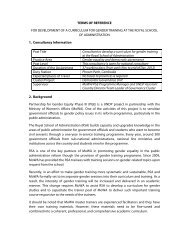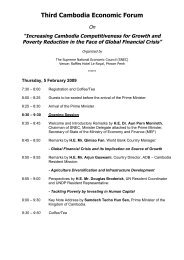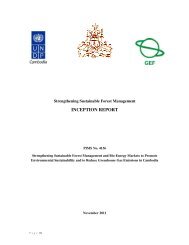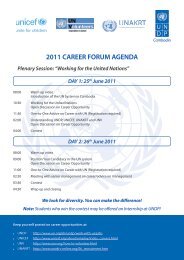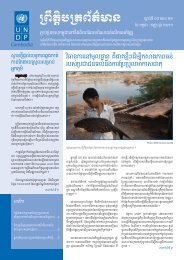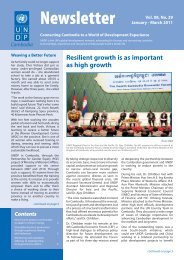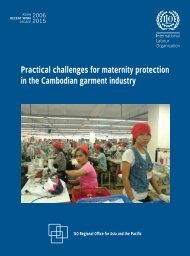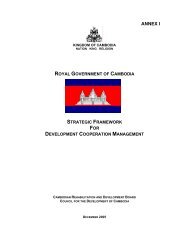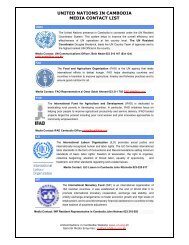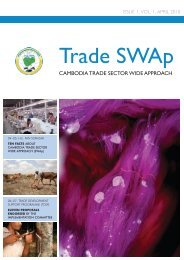UN Analysis Final.pdf - United Nations in Cambodia
UN Analysis Final.pdf - United Nations in Cambodia
UN Analysis Final.pdf - United Nations in Cambodia
Create successful ePaper yourself
Turn your PDF publications into a flip-book with our unique Google optimized e-Paper software.
they migrate for work. Many youths reported that it is essential for them to work to reduce the vulnerability of<br />
their <strong>in</strong>dividual families. These issues were frequently reflected <strong>in</strong> focus group comments:<br />
When we were <strong>in</strong> school we had high hopes that <strong>in</strong> the near future we would f<strong>in</strong>d a very good job with good<br />
pay because of our precious knowledge. But now everyth<strong>in</strong>g has changed because we had to leave school<br />
and come to work here to help our parents and family... – FGD with female youth 20-24, Poi Pet, Banteay<br />
Meanchey<br />
We are not happy that we did not have a chance to stay long <strong>in</strong> school. It is difficult for those who have<br />
little knowledge to make money. For example, if we cannot read or write we cannot work <strong>in</strong> jobs such as <strong>in</strong><br />
garment factories; we totally lose hope and do not know what else to do besides rice farm<strong>in</strong>g and sell<strong>in</strong>g our<br />
labour… – FGD with female youth 20-24, Cheung Kor village, Sihanoukville<br />
Girls’ Employment: Accord<strong>in</strong>g to the 2001 CLS, 87 per cent of girls aged 15-17 were work<strong>in</strong>g at the time of<br />
the survey, compared to 81 per cent of boys (Understand<strong>in</strong>g Children’s Work, 2006). From age 12, household<br />
work is significantly more likely to <strong>in</strong>terfere with girls’ education than boys’. Children who work more than<br />
14 hours a week – who are more likely to be poor, rural and female – start to fall beh<strong>in</strong>d <strong>in</strong> grade atta<strong>in</strong>ment<br />
compared to their peers who only attend school (Ragatz 2005).<br />
Discussions across the six study prov<strong>in</strong>ces among youth aged 15-19 and 20-24 years yielded similar and<br />
consistent responses to the effect that females were more likely to be engaged <strong>in</strong> both productive and<br />
domestic work than the males. They strongly argued that girls seem to have more demand<strong>in</strong>g work than<br />
the boys. The burden of housework and productive work is a particular problem for rural households.<br />
In pr<strong>in</strong>ciple, men and women have equal rights to education; but families hardly decide <strong>in</strong> favour of their<br />
daughter’s education when school is far away from home… Many households here are still poor and both<br />
men and women have to work... the young women need to work hard to susta<strong>in</strong> the livelihood of the family...<br />
– FGD with mothers’ group, Ratanakiri<br />
We really want to pursue our education just like other girls from rich families, but it seems totally impossible<br />
s<strong>in</strong>ce our family is very poor and need our support <strong>in</strong> mak<strong>in</strong>g money. We at least have to help our family<br />
with housework such as car<strong>in</strong>g for our little brother or sister or look<strong>in</strong>g after the animals…those who have<br />
a good education can f<strong>in</strong>d a good job <strong>in</strong> garment factories <strong>in</strong> Phnom Penh…It is difficult for us even to go to<br />
search for work s<strong>in</strong>ce we can hardly read or write… – FGD with female youth (age 20-24), Sangke Village,<br />
Svay Rieng<br />
Field observations also suggest that young women drop out of school to migrate for work to supplement<br />
family <strong>in</strong>come. Many young people and youths seek employment <strong>in</strong> urban Poipet. Information gathered<br />
reveals, however, that only a small proportion of them get decent jobs, while large numbers work under<br />
difficult and vulnerable conditions.<br />
To reduce the direct costs of education and to mitigate the loss of <strong>in</strong>come due to time spent at school, MoEYS<br />
has launched a significant <strong>in</strong>itiative to provide targeted ‘scholarships’ to encourage poor children – particularly<br />
girls – to rema<strong>in</strong> <strong>in</strong> school (Box 4-5).<br />
Situation <strong>Analysis</strong> of Youth <strong>in</strong> <strong>Cambodia</strong><br />
47



